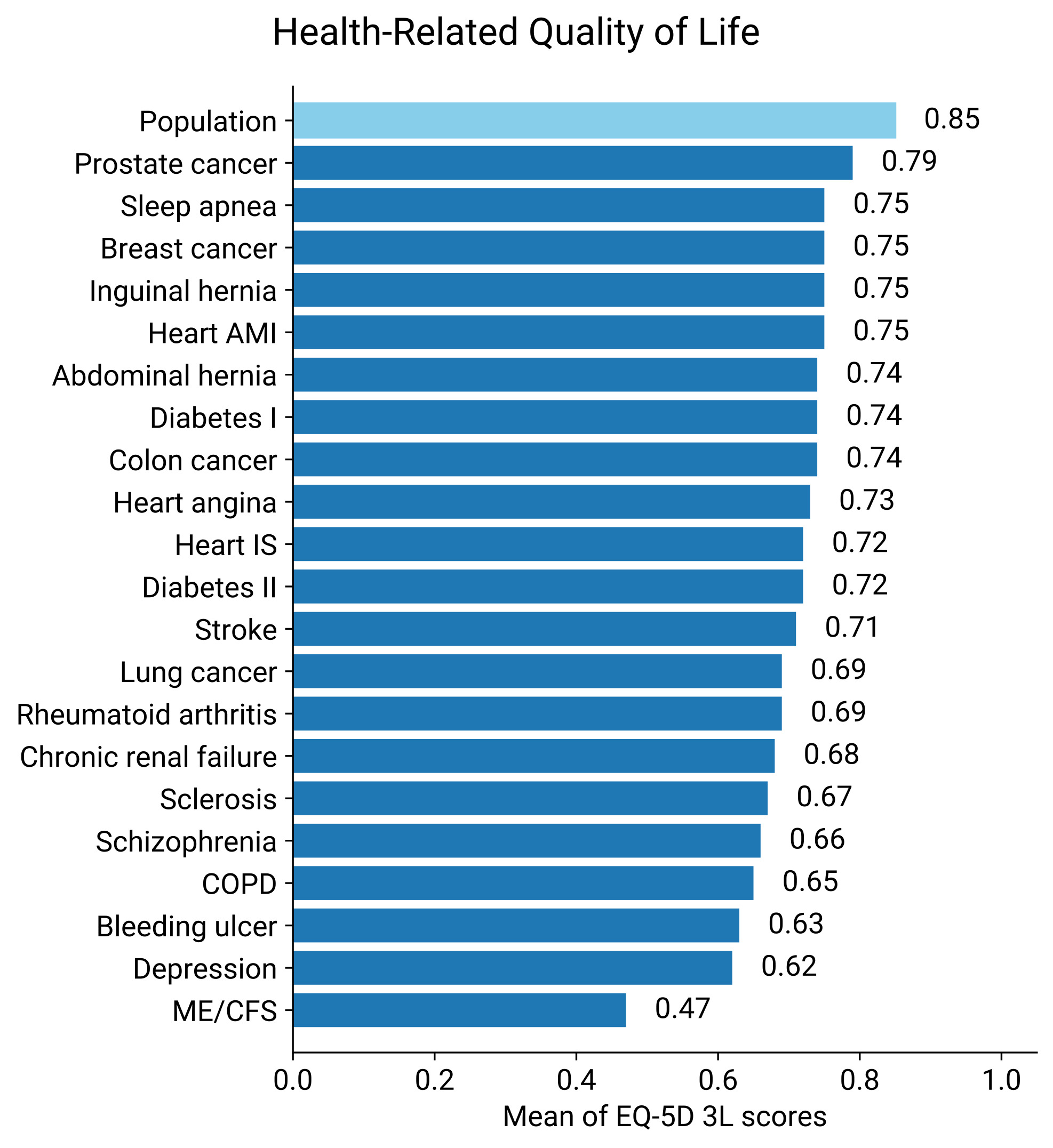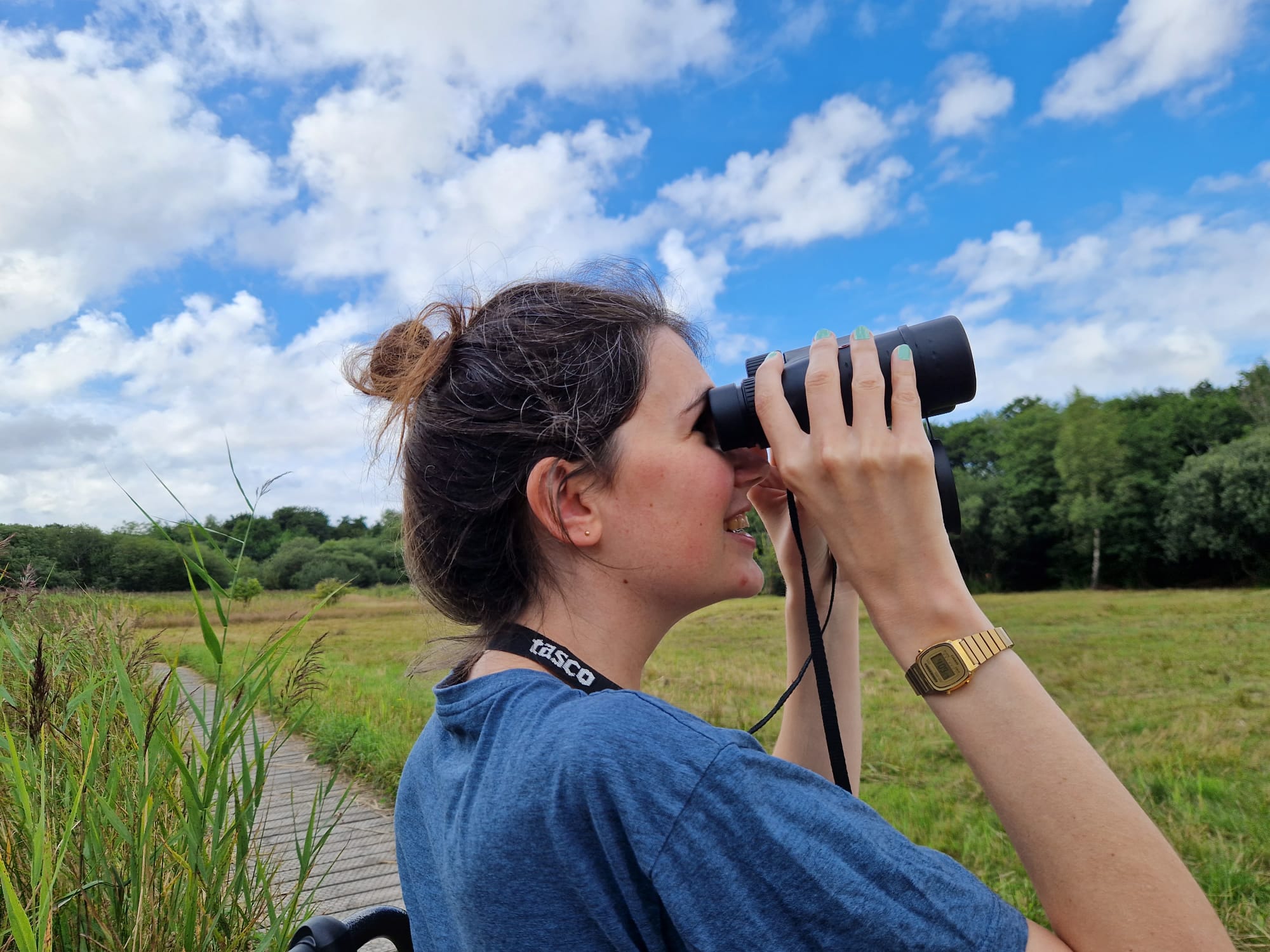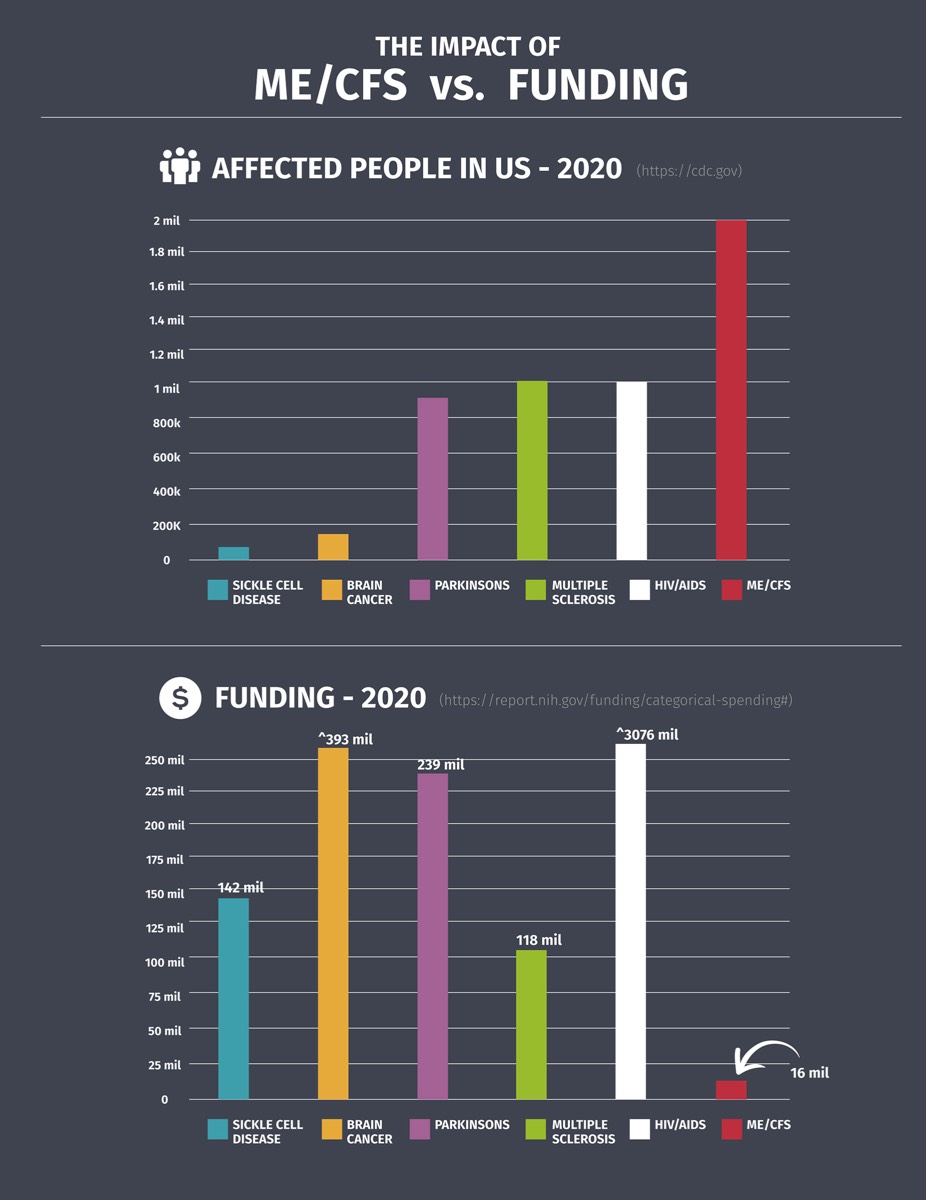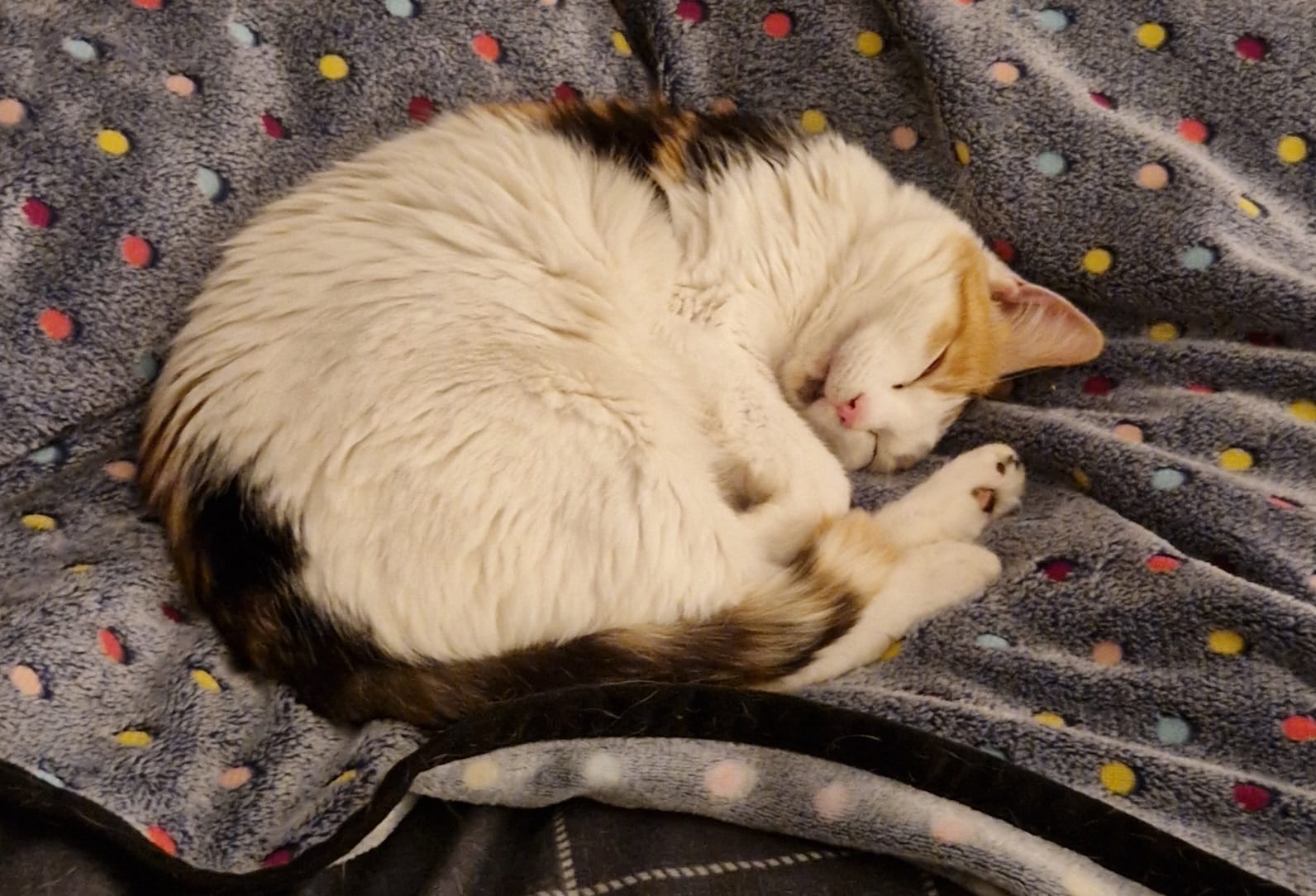Story
Hi folks, this is Rebecca’s partner Kyle, writing on her behalf. Rebecca's birthday is coming up on 17th October and in lieu of gifts this year she's asking for people to donate towards ME Research UK. Any amount, big or small, would mean the world to us, and please feel free to include a message to Rebecca in your donation and I'll gladly pass it along. This is a cause that is very important to Rebecca, and so I want to provide some context and information about ME here, as well as using this as an opportunity to update you all on Rebecca’s current condition and her journey with it.
Rebecca's Long COVID Journey
Rebecca caught COVID in December 2021 and initially her symptoms were pretty mild and not overly concerning. After a couple of days she started to feel incredibly fatigued however, and then as days turned to weeks and the fatigue only increased, it started to become clear that something wasn't right. Over the course of the next few weeks, even gentle exercise such as walking for half an hour would start to leave her completely exhausted, with headaches and brain fog, and these symptoms would usually worsen over the following day or two. Nothing seemed to improve her condition, and she found that the only thing that would even stabilise her symptoms was to do less. Pushing through inevitably only seemed to make her worse.
After several months of this, many (largely unhelpful) doctors appointments, and a lot of independent research, we started to learn a lot about this thing called Long COVID. Long COVID is a bit of an umbrella term, used to describe a number of long-term conditions and symptoms resulting from a COVID infection, persisting beyond the acute infection phase. It's estimated that as many as 1 in 10 COVID infections lead to long-term health issues, and this short video covers some of the many different symptoms under the Long COVID umbrella:
In these first few months, as well as learning about other poorly understood conditions such as PoTS and MCAS which Rebecca seemed to have developed as part of her Long COVID, the condition that stood out most in our research was ME, which seemed to describe Rebecca’s most significant symptoms almost exactly.
What is ME?
ME (Myalgic Encephalomyelitis) is a chronic health condition which affects almost all systems of the body, often triggered by a viral infection such as Glandular Fever, Chickenpox, or increasingly COVID-19. Its hallmark characteristic is what’s known as PEM (Post-Exertional Malaise), which is when symptoms worsen following exertion. 'Exertion’ here can mean strenuous physical exercise, but it could also mean gentle movements, or even mental or emotional effort; simply reading a book, or watching TV, or at its most extreme even just feeling strong emotions can be enough to trigger PEM.
This video gives a good overview of what ME and PEM looks like, especially on the more severe end:
Fatigue is the most well known symptom of ME, but ‘fatigue’ really undersells what it feels like, and what’s happening in the body. It’s not just tiredness, it’s complete exhaustion on a fundamental, cellular level. Cells can’t get the energy they need to function properly and this can cause a whole host of issues and symptoms across the whole body: headaches, brain fog, digestive issues, dizziness, sleep dysregulation, joint pain, sensitivity to light and sound, the list goes on. After experiencing a PEM ‘crash’, often the body will recover to its previous baseline after a day or two, maybe a week. Sometimes it doesn’t bounce back however, resulting in a permanent baseline reduction which means it takes an even smaller amount of exertion to trigger a worsening of the condition next time.

[Chart showing the mean quality of life score for ME compared to various other health conditions]
Ultimately, if a person's ME continues to worsen and not bounce back, it can result in a situation where even basic bodily functions needed to survive can trigger a PEM crash, resulting in a vicious downward spiral. Eventually just tolerating light or sound or the presence of another person in the room can cause a worsening of symptoms, leading to people with the most severe form of ME having to spend all day alone in a dark room, unable to even do anything to distract themselves. At its worst the body can become physically unable to perform basic necessary functions such as swallowing food, and the condition becomes life-threatening.
Rebecca's Severe ME

[Rebecca in her wheelchair in summer 2022, the last time she was able to leave the house for more than a short outing]
This pattern of repeated worsening and then not recovering happened to Rebecca over the course of 2022, as her condition slowly deteriorated. By summer, she started to need a wheelchair to get around. By late 2022 she could barely leave the house at all, even with her wheelchair, and by the time the new year came around she struggled to even walk to the bathroom without ending up totally exhausted. Despite trying to pace herself and rest as much as possible to avoid further decline, a few weeks in to 2023 she couldn’t even make it to the bathroom, and soon after her condition quickly deteriorated the point where she was physically unable to even feed herself or brush her own teeth.
Since then, for almost 2 years now, Rebecca has been totally bed-bound, unable to even stand or even really sit upright without assistance. In the summer of 2023 Rebecca herself came incredibly close to being unable to eat and it is only through a combination of a lot of patience, dedication, and luck that Rebecca avoided needing to be hospitalised and likely tube-fed. Thankfully Rebecca's condition has stabilised since to the point that she can say a few words and listen to audiobooks (at half speed) without triggering a crash, but the possibility always remains that Rebecca could worsen again to that extent, and any slight improvements can never be taken for granted.
I have been caring for Rebecca this whole time with the incredible support of our family and friends, especially both of our wonderful mums. One of the many cruelties of this condition at the most severe end though is that it can make the presence of other people intolerable, and so having help from professional carers or even dear family or friends becomes almost impossible without risking a further decline. I feel incredibly privileged that Rebecca tolerates my presence and I can care for her, but it is also a great responsibility as nobody else can step in, as much as they (and Rebecca) might want them to. I had to take several months off of work when Rebecca was at her worst, and I am still only able to work part time as she continues to need round-the-clock care. Thankfully I'm lucky enough with my work situation to be able to do this, but many others don't have this privilege.
One of the hardest parts of all of this is having to live with the constant threat of COVID reinfection, which could be catastrophic for Rebecca. As COVID continues to spread and continually reinfect with the complete lack of mitigations now in place, we - like many disabled and immunocompromised people - have to permanently isolate and take extreme measures to avoid catching it. Despite spending most of the day with Rebecca every day for the past 2 years, I can count on one hand the amount of times she's seen my face without a mask on, as I can't risk potentially passing something on to her.
It really is hard for me to effectively get across how hellish this condition is, and how much of a nightmare and a battle every single day is. This video from YouTuber Physics Girl, who also has very severe ME/Long COVID, gives a tiny glimpse in to what life can be like. But where you might see a short glimpse of someone lying in a dark room with earplugs and an eyemask on, for people with very severe ME this is their life all day, every day, with no relief, often in a great deal of pain and discomfort and with very little hope of recovery.
The State of ME Treatment
There have been numerous cases of young women in the UK being hospitalised this year alone, and tragically several have lost their lives in recent years due to a lack of understanding of the condition and an inability to administer the right care that could have saved their lives. One such case was Maeve Boothby O’Neill. On the day I'm writing this the coroner's report into her death has just been released and it is damning:
"The inquest heard that provision of care for patients with severe ME, such as that which Maeve suffered from, was and is non-existent and that being placed on a ward that did not have expertise in her condition made her admission to hospital very difficult for her to endure.”
I would highly recommend watching this segment on BBC Breakfast with her mother Sarah, and Dr Binita Kane, discussing Maeve’s case and also what we know about ME.
Despite how ME is often framed - as this mysterious illness we know nothing about - we do in fact know a lot about it and what it does to people’s bodies. We just need further research to continue to investigate and find effective treatments. The below chart shows the number of people affected by various conditions in the US as of 2020, and how much funding each one receives. ME clearly affects the greatest number of people on this chart, yet receives by far the smallest amount of funding.

It's so important to stress that there is no current treatment for ME. Certain other related conditions and peripheral symptoms can be managed or treated to an extent, but the core of the condition can at best only be managed by resting and avoiding PEM. There is little to no support available on the NHS or even from private doctors, and in fact dealing with doctors and seeking healthcare can more often than not end up hurting rather than helping.
ME is an incredibly misunderstood illness, for a number of reasons. First and foremost, it affects many more women than men, and so like a lot of conditions primarily affecting women it has long been ignored, minimised, and psychologised, and even today it’s not unlikely to be told by a doctor that it’s all in your head and you can just think yourself better. There have been frequent efforts to position ME as a psychological condition and minimise its seriousness, and there is a particularly egregious history of this here in the UK. George Monbiot wrote an excellent article for the Guardian on this subject earlier this year: https://www.theguardian.com/commentisfree/2024/mar/12/chronic-fatigue-syndrome-me-treatments-social-services
A prime example of the efforts to minimise ME is the adoption of the much less serious sounding name ‘Chronic Fatigue Syndrome’, which happened in the UK in 1996. This name - which makes it sound like it's just a case of tiredness to overcome - is still often used interchangeably with ME, especially here in the UK, where you’re far more likely to get an official diagnosis of Chronic Fatigue Syndrome.
Most of the treatment prescribed by the NHS is often either totally ineffective or at its worst actively harmful. GET (Graded Exercise Therapy) is still often pushed on people with ME, encouraging them to try and do a little more exercise each day to build up a tolerance, despite being proven to be harmful and explicitly warned against in the latest NICE guidelines for the condition, which are often ignored. CBT is also commonly recommended - again, harmfully framing the condition as something that can be overcome with the right mental attitude.
Official figures place the number of people living with ME in the UK at roughly 250,000 but it is likely far higher - Action for M.E currently estimate the actual figure to be 1.3 million (https://www.actionforme.org.uk/get-information/what-is-me/how-many-people-have-me-in-the-uk/), and that number is growing every day as more people develop the condition from COVID. It's estimated that around a quarter of these people with ME are on the severe end of the scale, but even so-called 'mild' ME is incredibly disabling.
For all of these reasons, for her birthday this year Rebecca has asked for donations towards ME Research UK, an organisation who are committed to funding biomedical research in to the condition. ME research has all too often been focused on testing psychological and rehabilitative interventions when we know that there are serious issues at play on a biological, cellular level. If ME is to be cured, we need to be focusing on this kind of research. And we do need to find a cure, desperately and urgently.
Thank You!
Thanks for reading this far. As a reward for your dedication here's a photo of our cat Cinnamon practicing radical rest in solidarity with Rebecca.

Rebecca sends her love to all of you, and she misses you all greatly. She's unable to use her phone in any capacity, but I'm always happy to pass on messages to her - she loves hearing from people. Many of you will have my phone number or can likely get it from someone else who does (I don't really want to publish it on a public website here!), or alternatively I do monitor Rebecca's phone so you can message her there as well and I should get it.
If any of the descriptions of ME or Long COVID I've written here sound familiar to you or your loved ones, and you want more information or guidance in trying to navigate these confusing and uncertain waters, please feel free to reach out and I'd be more than happy to share anything and everything I've learned over the past few years.
As a final note, aside from donating, the greatest gift you can give Rebecca is to continue to take COVID seriously - wear a high quality mask, ventilate spaces (COVID hangs around in the air like smoke!) and test when feeling unwell (ideally multiple tests 24hrs apart as false negative are common). As I write this it appears there's a new strain (XEC) on the rise, tearing through the country. Please try to avoid getting it and spreading it to others. We can't stress enough how much you're on your own if you end up with long term health issues as a result, and we desperately want others to avoid having to deal with this.
With love, Kyle and Rebecca.
[Cover photo is from the last trip Rebecca was well enough to take in summer 2022. She had to be carried down the beach to sit briefly in the sea, one of her favourite places.]
